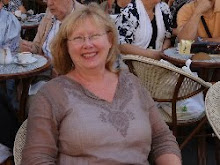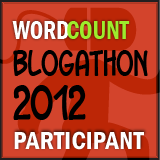Just one of many jarring encounters. I read the menu outside and didn't see a single taco or burrito mentioned.
When a flight starts with stairs being rolled up to the back exit of a plane so the police can board and remove a man arguing loudly in a language you don’t understand and ends with the plane bouncing down the runway as someone sounding suspiciously like a flight attendant exclaims “Hamdoulah!” (Thanks to God), well then, you know that you’re about to experience something new. You’ve left the straight up and down world of American/European culture and entered a world as different and mesmerizing as the narrow streets of the medinas that define North Africa.
In December, my husband Brad had a math conference in Tunisia. This would be the first time I joined him because, among other stupid reasons, I was a bit afraid I couldn’t survive on my own in such a foreign country while Brad was doing his math thing. Traveling in Europe, even if I don’t speak the language, is no problem. I see much of my world in theirs. North Africa, though? Language, food, habits, everything would be different, I thought. What if I accidentally offended someone? I wouldn’t be up to it. So I had to conquer my silly fears and head to Tunisia finally.
While the trip only lasted five days, I have more to talk about than can be contained in a single blog post. Since this country is probably not on the radar for most of you, let me bring you up to speed.
Tunisia is a small (tiny) piece of land along the Mediterranean Sea wedged between Algeria and Libya. Population is a little over 10 million, most of the people living in the capital of Tunis or along the east coast. It has verdant farmland as rich as Missouri’s bottomland, rocky mountains providing building materials for Roman ruins, and the Sahara. An educated country, even your porter at the hotel can speak Arabic, French, and one other language. While 98% of the people are Muslims, the modern government has been secular, perhaps because of its position as a French colony until they gained their independence in the 1950s. And if the word “Tunisia” rings a bell, it might be because this country was the site of the Jasmine Revolution that began what we now call the “Arab Spring.” The people we met, however, didn’t want to be connected to the Arab Spring because their revolution is more or less over and done with. They’ve had a change in government, they voted on a new constitution, they work hard to convince the tourists to return to their resorts along their gleaming beaches -- Inshallah (Allah willing).
Our driver sped down the highway toward our resort community of Yasmine-Hammamet with the full moon blinding us through one window and billboards of Cameron Diaz selling watches, Jennifer Lopez selling shampoo, and George Clooney selling coffee makers whizzing past the other. And Coca-Cola. Always Coca-Cola. It has to be the most universal brand, the taste around which feuding nations rally. Is there a country that doesn’t sell those red cans?
As we left the lights of the historic city of Tunis (ancient Carthage) behind and my eyes adjusted to the dark, I squinted and tried to get a sense of this country. About all I was sure of was that the lines in the highway were mere suggestions for where cars could drive. Things I saw along the highway were so unfamiliar at times that I was suspected they were mirages.
A short list of what I think I saw in the dark:
-- a lot of cars and trucks pulled over by police (that many lawbreakers? that vigilant a speed trap? or something else?)
-- huge convoys of trucks just sitting on the side of the highway; I think our driver said that’s just where they stop and sleep for the night
-- grapes-of-wrath style flatbed trucks with hay or vegetables piled as high as a 2-story house, held by a single rope
-- a man pushing a bicycle along the shoulder with belongings stacked higher than his head. Was that a goat walking beside him?
-- on second thought, that was a donkey, not a bicycle
-- French road signs and French toll booths; Tunisia may have thrown off the shackles of colonialism, but why fix what ain’t broke
-- me, in a car, under the brightest moon of my life, driving through North Africa
Come back soon for more stories of my time in Tunisia. Meanwhile, tell us in the comments box where have you visited that you felt the most out of place. Or, what was the most exotic place you’ve visited and why did you go?
In December, my husband Brad had a math conference in Tunisia. This would be the first time I joined him because, among other stupid reasons, I was a bit afraid I couldn’t survive on my own in such a foreign country while Brad was doing his math thing. Traveling in Europe, even if I don’t speak the language, is no problem. I see much of my world in theirs. North Africa, though? Language, food, habits, everything would be different, I thought. What if I accidentally offended someone? I wouldn’t be up to it. So I had to conquer my silly fears and head to Tunisia finally.
While the trip only lasted five days, I have more to talk about than can be contained in a single blog post. Since this country is probably not on the radar for most of you, let me bring you up to speed.
Tunisia is a small (tiny) piece of land along the Mediterranean Sea wedged between Algeria and Libya. Population is a little over 10 million, most of the people living in the capital of Tunis or along the east coast. It has verdant farmland as rich as Missouri’s bottomland, rocky mountains providing building materials for Roman ruins, and the Sahara. An educated country, even your porter at the hotel can speak Arabic, French, and one other language. While 98% of the people are Muslims, the modern government has been secular, perhaps because of its position as a French colony until they gained their independence in the 1950s. And if the word “Tunisia” rings a bell, it might be because this country was the site of the Jasmine Revolution that began what we now call the “Arab Spring.” The people we met, however, didn’t want to be connected to the Arab Spring because their revolution is more or less over and done with. They’ve had a change in government, they voted on a new constitution, they work hard to convince the tourists to return to their resorts along their gleaming beaches -- Inshallah (Allah willing).
Our driver sped down the highway toward our resort community of Yasmine-Hammamet with the full moon blinding us through one window and billboards of Cameron Diaz selling watches, Jennifer Lopez selling shampoo, and George Clooney selling coffee makers whizzing past the other. And Coca-Cola. Always Coca-Cola. It has to be the most universal brand, the taste around which feuding nations rally. Is there a country that doesn’t sell those red cans?
As we left the lights of the historic city of Tunis (ancient Carthage) behind and my eyes adjusted to the dark, I squinted and tried to get a sense of this country. About all I was sure of was that the lines in the highway were mere suggestions for where cars could drive. Things I saw along the highway were so unfamiliar at times that I was suspected they were mirages.
A short list of what I think I saw in the dark:
-- a lot of cars and trucks pulled over by police (that many lawbreakers? that vigilant a speed trap? or something else?)
-- huge convoys of trucks just sitting on the side of the highway; I think our driver said that’s just where they stop and sleep for the night
-- grapes-of-wrath style flatbed trucks with hay or vegetables piled as high as a 2-story house, held by a single rope
-- a man pushing a bicycle along the shoulder with belongings stacked higher than his head. Was that a goat walking beside him?
-- on second thought, that was a donkey, not a bicycle
-- French road signs and French toll booths; Tunisia may have thrown off the shackles of colonialism, but why fix what ain’t broke
-- me, in a car, under the brightest moon of my life, driving through North Africa
Come back soon for more stories of my time in Tunisia. Meanwhile, tell us in the comments box where have you visited that you felt the most out of place. Or, what was the most exotic place you’ve visited and why did you go?
Camels were absolutely everywhere. Unfortunately on this trip I didn't have the chance to get close to one.






![Grace [Eventually]: Thoughts on Faith](http://photo.goodreads.com/books/1166504427s/12542.jpg)








